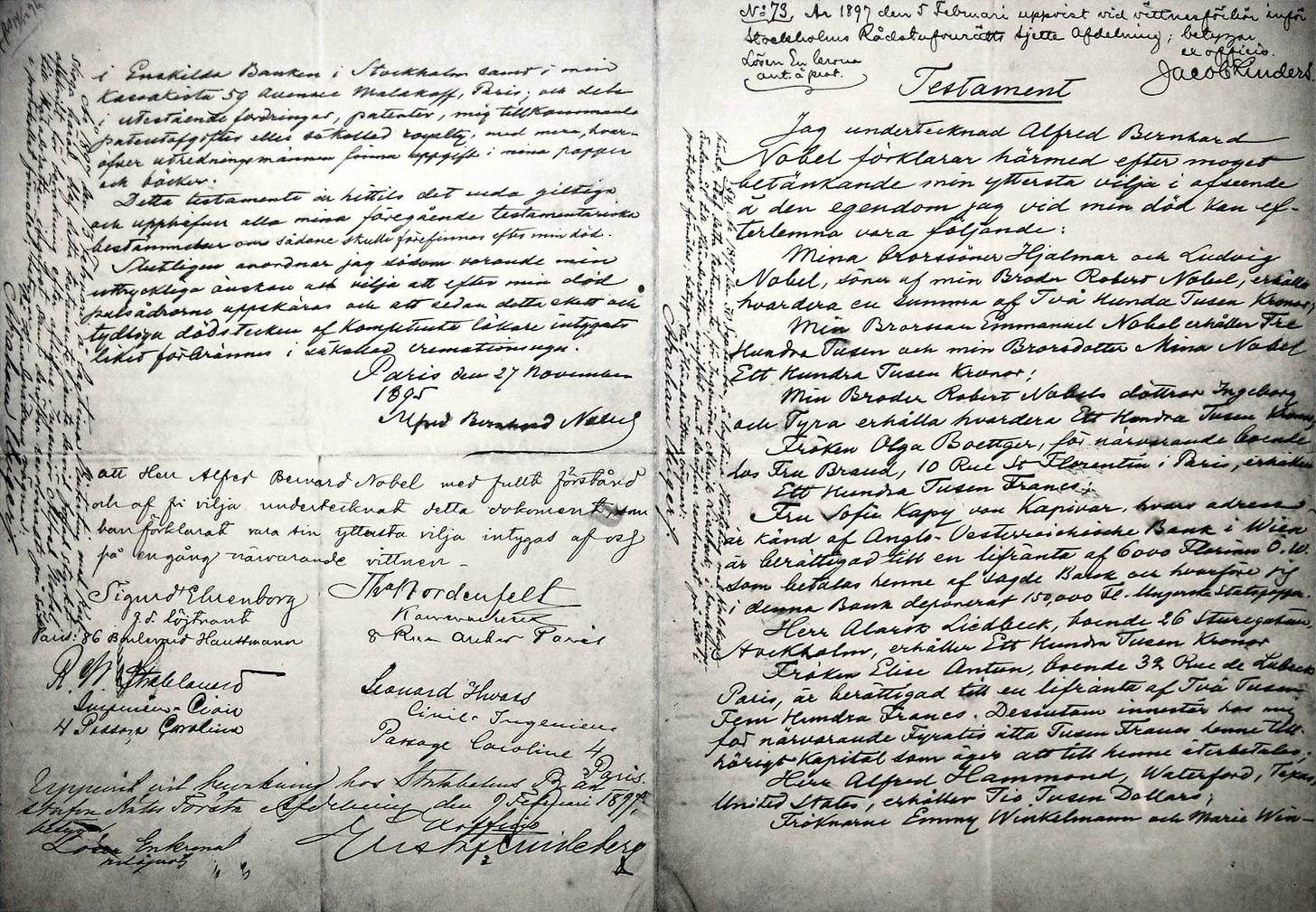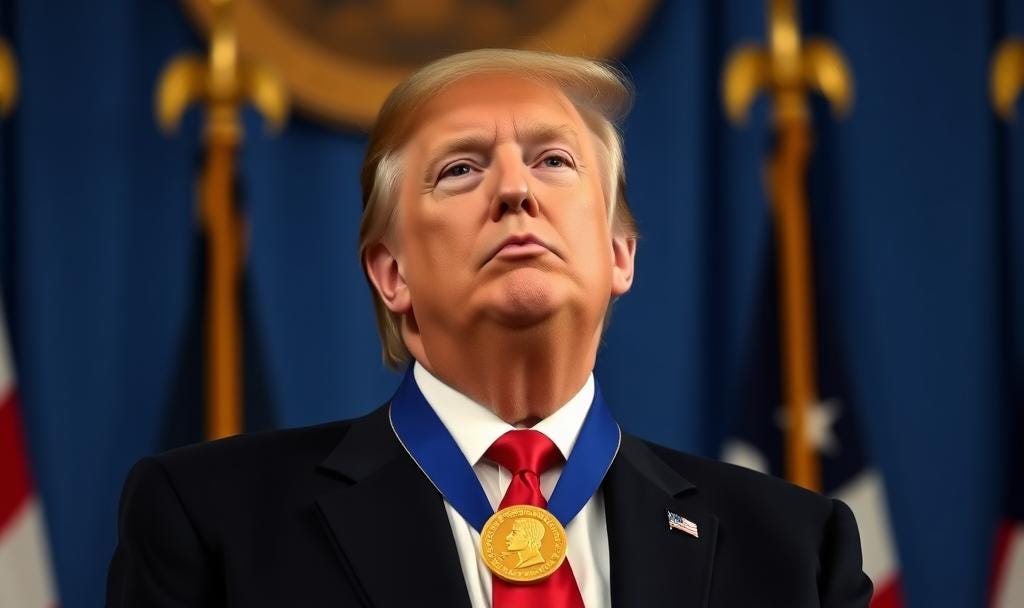How a Nobel Prize became Trump’s new foreign policy
Donald Trump’s obsession with the Nobel Peace Prize is reshaping U.S. diplomacy — with India losing out while Pakistan cashes in
By Sanjay Dubey
The Nobel Prizes, established by the will of Swedish industrialist and inventor Alfred Nobel, are widely regarded as the most prestigious awards given for intellectual achievement and contributions to humanity in the world. Among these, the Nobel Peace Prize holds a unique global significance. It is an extraordinary honor that contributes significantly to the global image, historical legacy, and domestic standing of the most powerful people in the world. It places them among a rare group of global figures such as Nelson Mandela, Dalai Lama, Theodore Roosevelt, and Barack Obama.
The Prize seems to hold even greater significance for U.S. President Donald Trump. He has often expressed frustration at not winning the award and openly questioned the Nobel Committee's past decisions, saying, ‘they only give Peace Prize to liberals (read democrats)’. His predecessor, Barack Obama, was awarded before he completed the first year of his presidency, which makes him a special target of Trump. This stands in stark contrast to most former presidents, who rarely, if ever, publicly campaigned for or complained about not winning the prize.
For Donald Trump, winning the Nobel would mean rewriting a century of its history, particularly for U.S. Presidents. To date, only four U.S. Presidents—Theodore Roosevelt (1906), Woodrow Wilson (1919), Jimmy Carter (2002), and Barack Obama (2009)—and one Vice President, Al Gore (2007), have been laureates. Notably, Theodore Roosevelt, awarded 119 years ago, stands as the sole Republican among them. In stark contrast, three of the four Democratic recipients have won the prize in the present century alone.
Nobel moves
According to the will of Alfred Nobel, the Nobel Peace Prize is to be awarded to those who have "done the most or the best work for fraternity between nations, for the abolition or reduction of standing armies and for the holding and promotion of peace congresses.

Donalds Trump's strongest argument for the Nobel Peace Prize centers around the Abraham Accords. These 2020 agreements between Israel and several Arab nations (UAE, Bahrain, Sudan, Morocco) were a significant diplomatic breakthrough. They fostered diplomatic ties in a historically volatile region and aligned directly with the Nobel Committee's aims of promoting "fraternity between nations." Trump actively took credit for these accords, presenting them as a testament to his peacemaking prowess and a clear basis for a Nobel nomination.
During his first term, Trump also held unprecedented direct talks with North Korea’s Kim Jong Un. This was a significast departure from previous US policy and clearly aligned with the Nobel Peace Prize’s criteria of 'fraternity between nations' and contributing to the 'abolition or reduction of standing armies' (or nuclear arsenals). However, nothing concrete was achieved from the talks and North Korea continued to develop its missile and nuclear programs.
Donald Trump’s pursuit of recognition, in his second term, extends to various recent and ongoing conflicts. With regard to the recent India-Pakistan conflict, Trump has repeatedly claimed credit for mediating a ceasefire between the two nuclear-armed rivals, even linking it to trade negotiations. Pakistan has publicly acknowledged Trump's efforts in ushering in the peace between the two nations and formally nominated him for the Nobel Peace Prize.
Trump has also frequently expressed his desire to broker a swift end to the Russia-Ukraine war (in just 24 hours). For him, ending such a major European conflict, with its immense global implications, would undoubtedly be framed as a monumental peace achievement. While nothing seems to have worked on this front, many link Trump’s continued insistence on a quick, personally mediated peace to his desire for the Nobel Peace Prize.
More recently, what happened during the Israel-Iran conflict might also provide insights into this dynamic. Following recent U.S. authorised strikes on Iranian nuclear facilities and a swift "ceasefire" declared by Trump, Israeli Prime Minister Benjamin Netanyahu publicly nominated him for the Nobel Peace Prize.
This presents an interesting hypothetical scenario: Could Trump have offered all-out support to Israel if Netanyahu agreed to de-escalate the conflict on his terms once certain Israeli goals were achieved? This arrangement would have been a win-win for both, allowing Israel to quickly navigate a complex conflict and enabling Trump to present himself as a strong contender for the Nobel Peace Prize.
The newly brokered Rwanda and Congo-Kinshasa peace agreement further underscores Donald Trump’s desire for the Nobel. While hosting the signing of the agreement in the Oval Office, Trump took sole credit for ‘achieving peace where no previous U.S. president had succeeded’. He also said that he deserved a Nobel prize for his efforts in securing the peace deal.
The Roadblocks
Despite Donald Trump's repeated assertions that he should have received the Nobel Peace Prize at least four or five times, several factors complicate his Nobel aspirations.
History tells us that the Peace Prize has been awarded for lesser peace deals than the Abraham Accords brokered by Donald Trump. The 1978 prize to Menachem Begin and Anwar Sadat for the Camp David Accords, or the 1994 prize to Yasser Arafat, Shimon Peres, and Yitzhak Rabin for the Oslo Accords, shows that direct peace agreements, even if incomplete or with ongoing challenges, are highly valued.
Signed around the same time, Trump's mediated 'Kosovo and Serbia economic normalisation agreements' should also have boosted his chances for the Nobel Peace Prize. However, he did not receive it, likely because the Nobel Committee often makes a holistic judgment. His other actions created a mixed record that might have outweighed even a strong accomplishment like the Abraham Accords.
Trump’s first administration pursued an "America First" policy that led to America’s withdrawals from the Iran Nuclear Deal (JCPOA), the Paris Climate Accord, and the Intermediate-Range Nuclear Forces (INF) Treaty. He also withdrew from the UNHRC and the WHO.
This unilateral behaviour of Trump was also reflected in his persistent push for the construction of a wall on the U.S.-Mexico border and his strained relations with the United States’ traditional allies. Critics believe that Donald Trump's actions undermined 'fraternity between nations' and multilateral cooperation, which are core tenets of the Peace Prize.
Trump's refusal to accept the 2020 election results and his encouragement of rioting at Capitol Hill can also be seen as undermining the very foundations of peace.
The recent India-Pakistan conflict and subsequent ceasefire presented Trump with almost as big an opportunity as the Abraham Accords. However, India's consistent rejection of any third-party mediation in the ceasefire poses a direct obstacle to his claim of having resolved the conflict. For someone as focused on personal credit and recognition as Trump, this refusal to acknowledge his supposed role could be seen as a direct affront. Adding to this, Trump’s personal business dealings with Pakistan and his nomination for the Nobel Peace Prize by them make the situation even more intriguing. This may explain Trump’s sudden disregard for Indian sensitivities and interests and his growing political affection for Pakistan.
The peace agreement between Rwanda and Congo-Kinshasa also has several 'ifs and buts,' particularly considering the U.S.'s involvement in securing mineral rights in Congo. Trump sees global peace-making less as a goal in itself and more as a means of personal validation and transactional advantage. This makes his version of “peace” quite different from past laureates.
Donald Trump appears to be applying a similar, transactional formula to the Ukraine war, offering America’s support in enforcing peace between Ukraine and Russia in exchange for various considerations. Whether peace efforts driven by such transactional interests truly embody the spirit of the Nobel Peace Prize remains a significant question.
Donald Trump’s divisive rhetoric and unilateral tariff wars — even with U.S. allies — stand in stark contrast to the traditional image of a Nobel Peace Prize laureate. His actions such as shutting down USAID, which delivered crucial aid to vulnerable regions, also clash with the humanitarian ideals the award is meant to honour.
Beyond these challenges, serious personal controversies, such as those involving the Epstein issue, could further damage a leader's prospects. Allegations involving exploitation or criminal conduct directly contradict the core values of dignity and moral leadership that the Nobel Peace Prize aspires to uphold.
Considering everything discussed in this article, the Nobel Peace Prize seems to be a distant and unrealizable dream for Donald Trump. But miracles do happen when the stakes are sky high.
Of the Nobel Prizes, five are selected by Swedish organizations, and one (the Peace Prize) by the Norwegian Nobel Committee, appointed by the Parliament of Norway. Both of these countries are in Europe, a continent that has appeared powerful and prosperous largely due to continuous American support since World War II. That support, however, is not guaranteed under a Trump administration.
Given Donald Trump’s penchant for personal recognition, could a Nobel Peace Prize be leveraged to ensure that support? After all, such an award could boost 'fraternity' between America and the countries of the European Union, bringing a sense of security and calm, precisely why the Nobel Peace Prize was instituted.


